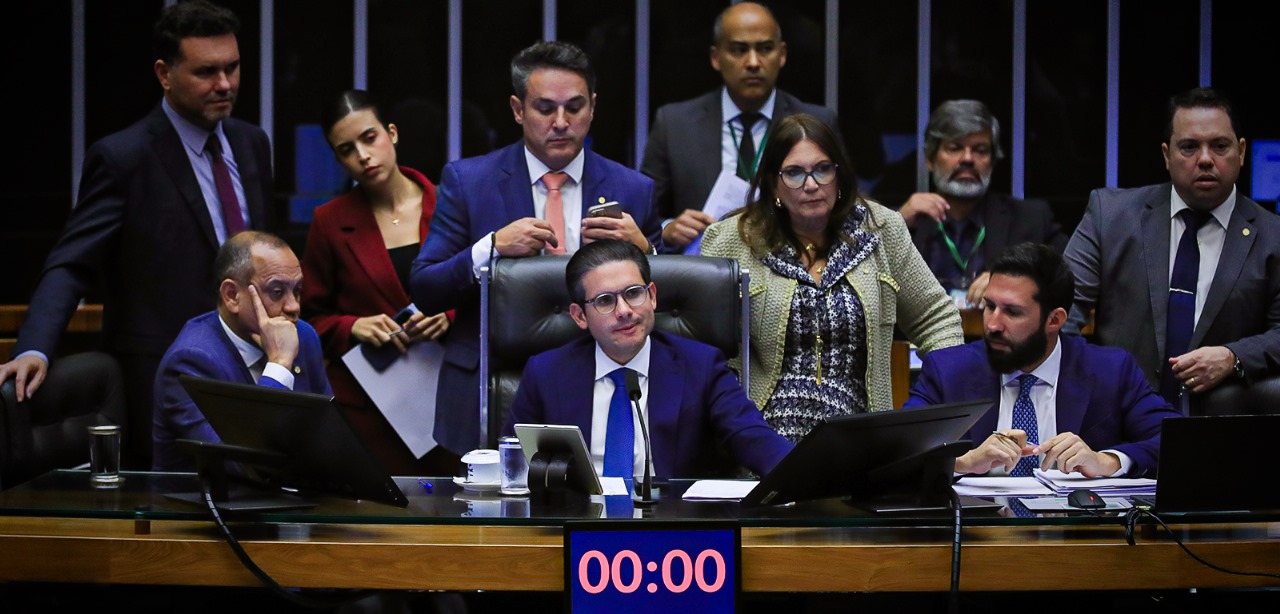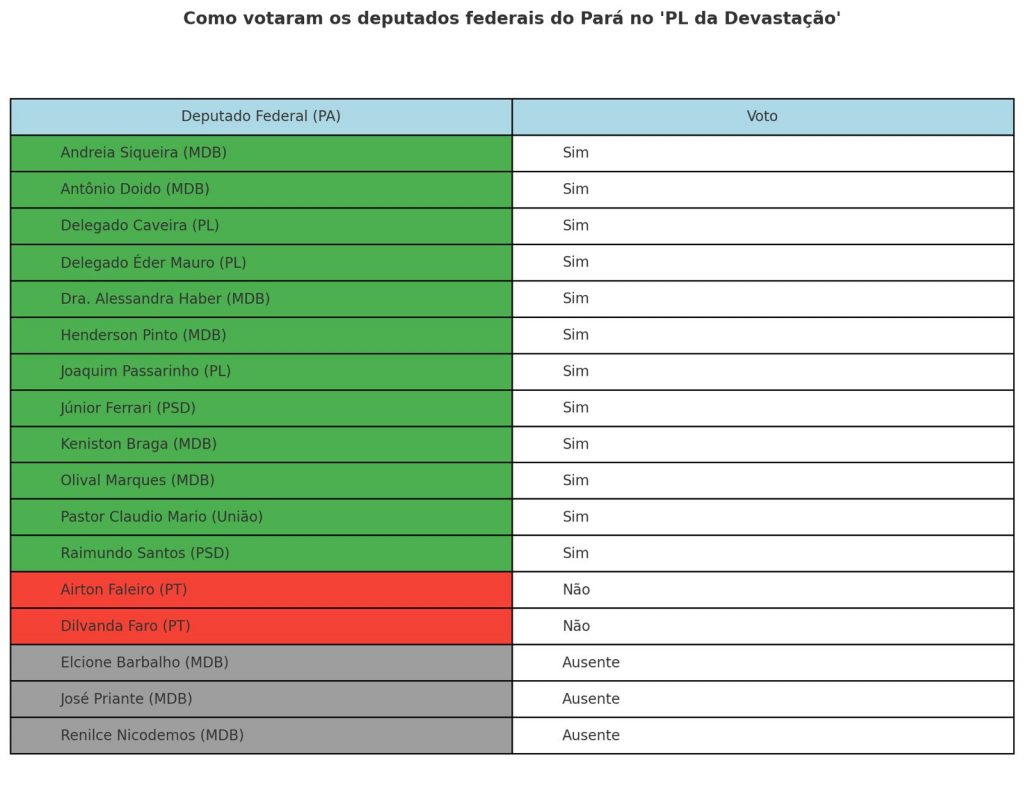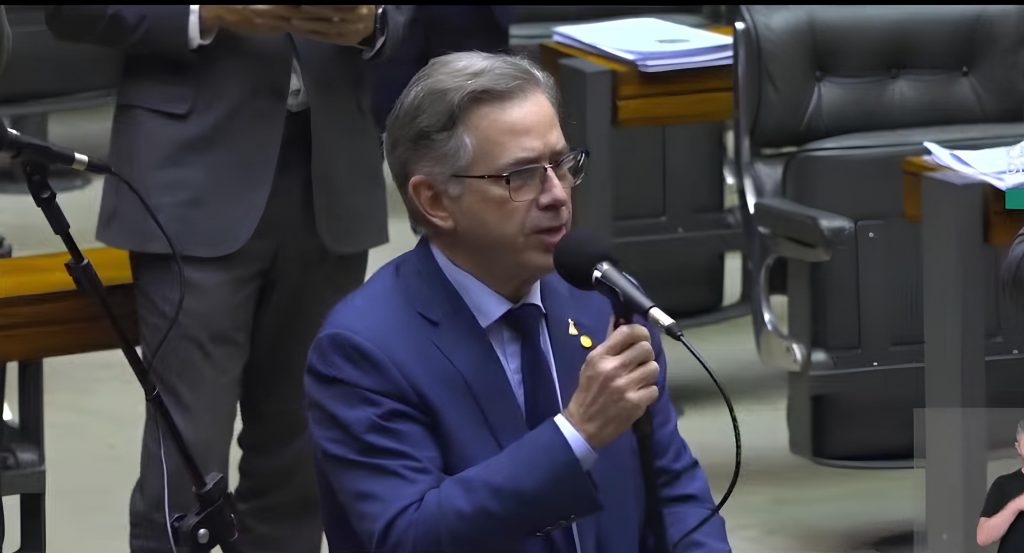Twelve Pará lawmakers vote in favor of ‘Devastation Bill’; see who they are
20 de July de 2025

By Fabyo Cruz – From Cenarium
BELÉM (PA) – The Chamber of Deputies approved, in the early hours of Thursday, the 17th, Bill 2159/21, referred to by environmentalists as the “Devastation Bill.” The bill, which now awaits President Lula’s (PT) approval, received strong backing from the Pará delegation: 12 of the state’s 17 federal deputies voted in favor, despite warnings from environmental organizations and experts that the new law could increase the risk of environmental damage, especially in the Legal Amazon, home to numerous traditional communities and endangered biodiversity.
Among those who supported the measure are delegates Éder Mauro (PL), Joaquim Passarinho (PL), Júnior Ferrari (PSD), and Andreia Siqueira (MDB). Deputies Antônio Doido (MDB), Delegado Caveira (PL), Dr. Alessandra Haber (MDB), Henderson Pinto (MDB), Keniston Braga (MDB), Olival Marques (MDB), Pastor Claudio Mariano (União), and Raimundo Santos (PSD) also voted “yes.”
On the other hand, only two deputies from Pará voted against the bill: Airton Faleiro and Dilvanda Faro, both from the Workers’ Party (PT). They are part of the minority that opposed the proposal, citing rollbacks in socio-environmental safeguards and flexibilities that could threaten sensitive areas, such as Indigenous Territories and conservation units.
Three lawmakers from Pará were absent and did not cast their votes: Elcione Barbalho, José Priante, and Renilce Nicodemos, all from the MDB.

During the floor vote, deputy Joaquim Passarinho defended the bill as necessary to unlock investments in the Amazon. In his speech, Passarinho cited the Araguaia-Tocantins waterway as a project stalled by environmental obstacles, using as an example the debates surrounding the Pedral do Lourenço – a natural rock formation in the Tocantins River between the municipalities of Marabá and Itupiranga, in southeastern Pará.

He concluded his statement by saying: “What devastates the environment, what kills the environment, is poverty and misery. Development doesn’t kill; we can make development and the environment compatible. But blocking development keeps our people in poverty and misery, destroying the environment.”
Changes
The approved bill profoundly alters Brazil’s current environmental licensing framework. Among the main changes is the creation of the Special Environmental License (LAE), which may be granted even for activities with a significant potential for environmental degradation, provided they are deemed strategic by the Government Council.
In addition, the new legislation introduces the License by Adhesion and Commitment (LAC), which waives the requirement for prior impact studies in several cases.
Other changes reduce the authority of federal agencies in the licensing process. The opinion of the National Foundation for Indigenous Peoples (Funai), for instance, will only be required for Indigenous Territories that have already been officially recognized, excluding around 259 territories still undergoing the demarcation process, according to a technical note from the Socio-Environmental Institute (ISA). The Chico Mendes Institute for Biodiversity Conservation (ICMBio) and the National Institute of Historic and Artistic Heritage (Iphan) will also have limited roles, and their recommendations will only be considered if submitted within short deadlines and with justification approved by the licensing authority.
Another controversial measure is the possibility of automatic renewal of environmental licenses, without the need for a new review, as long as the entrepreneur submits a declaration and a technical report. Oversight by environmental agencies such as Ibama will also be weakened, since final decisions will rest with the original licensing body, even if inspectors report irregularities.

